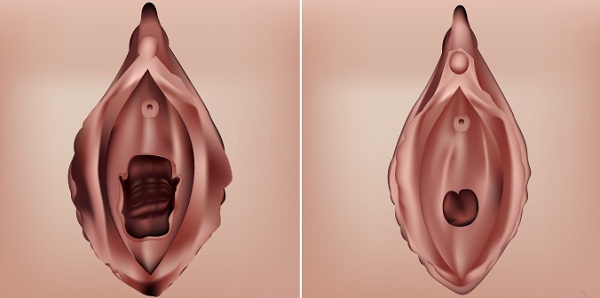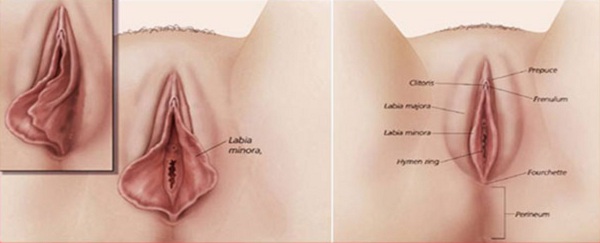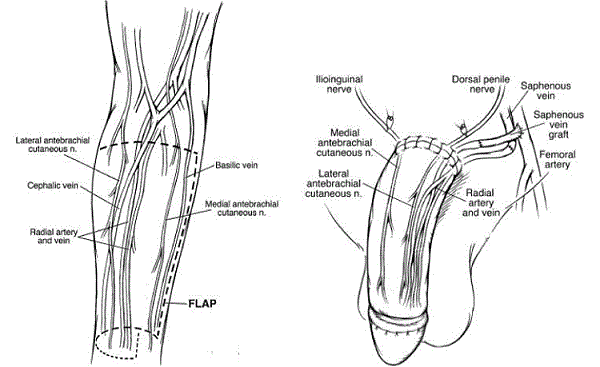Cosmetic Genital Surgery
Cosmetic genital surgery involves reshaping the labia, vulva or penis. Some people choose this surgery because they feel unhappy about the look of their genitals. An operation to change the look of the genitals is sometimes referred to as ‘aesthetic genital surgery’.

Labiaplasty
This surgery usually refers to the reduction of the labia minora, but it can also entaila reduction of the labia majora or an augmentation of either or both. A labiaplasty may be desired for several reasons: discomfort from rubbing against clothing, difficult or painful sexual intercourse, or the patient simply doesn’t like the way it looks, to name a few. The procedure is done by removing some of the tissue or injecting some filler.
Hymenoplasty
The hymen is the membrane that partially blocks the entrance to the vagina. It serves no real biological function in adults, and it is not a medical concern when it ruptures. Neither is its presence or absence a reliable indicator of virginity. However, some cultures place a great deal of value on the hymen, and so some women seek to have it repaired to uphold family honor or personal worth.
Penile Lengthning
Penis lengthning, or male enhancement, is the technique aimed to increase the size of a human penis. Some methods aim to increase total length, others the shaft’s girth, and yet others the glans size. Techniques include surgery, supplements, ointments, patches, and physical methods like pumping, jelqing, and traction.
Female genital reshaping, or labiaplasty, aims to change the size and shape of the inner labia or the inner lips of the vulva. Penis enlargement or augmentation surgery (phalloplasty) is used to increase the length, width or both of the penis.
Labiaplasty and phalloplasty are not the same as gender reassignment surgeries.
If you are concerned about the way you look, or are thinking about cosmetic treatments to boost your confidence, there are alternatives. Another option is to accept yourself the way you are and realise that normal, healthy genitals come in a wide range of shapes and sizes.
Before you choose cosmetic genital surgery, there are some important issues to keep in mind:
- Be aware that you will have scars. Although the scars may fade significantly with time, they will always be visible.
- Labiaplasty will not make the vagina smaller or tighter. This requires a different operation called a vaginoplasty.
- Phalloplasty can only increase the length or width of the penis shaft, not the head.
- Phalloplasty to lengthen the penis will only make the penis appear longer when flaccid – it will not be longer when erect. Think about the financial burden. Cosmetic surgery does not usually qualify for rebates from Medicare or private health insurance companies.
- Smokers are at increased risk of complications. If you are serious about undergoing cosmetic surgery, you should try to quit smoking.
Questions? We got Answers!
Before surgery, you need to discuss a range of medical issues with your doctor or surgeon including:
- Physical health – an examination will help your doctor or surgeon to decide if the treatment is appropriate.
- Medical history – some pre-existing conditions and surgeries you have had in the past may influence decisions about this operation, including the type of anaesthetic that is used.
- Psychiatric history – some surgeons may suggest or insist that you receive counselling before you consider cosmetic genital surgery.
- Risks and possible complications – it is important that you understand the risks and complications so that you can weigh up whether cosmetic genital surgery is right for you.
- Preparations and supplements – tell the surgeon about any that you take on a regular basis or have recently taken, including over-the-counter preparations such as fish oils and vitamin supplements.
- Past reactions to medications – tell the surgeon if you have ever had a bad reaction or a side effect from any medications including anaesthesia.
- Preparation for surgery – your surgeon will give you detailed instructions on what you should do at home to prepare for surgery. For example, you may be advised to take a particular medication or alter the dose of an existing medication. Follow all instructions carefully.
The details of the surgery will depend on individual factors, but generally include:
- Labiaplasty – the operation is usually performed to reduce the size of the labia minora (inner lips). General or local anaesthesia may be used. The surgeon removes the unwanted tissue and remodels the labia into the desired size and shape. Alternatively, a wedge-shaped section of the labia is removed. Some surgeons use a laser instead of a scalpel to reduce bleeding. Occasionally, a labiaplasty is performed to reduce the size of the labia majora (outer lips). Some women choose to have surgery to tighten the vagina (vaginoplasty) during the same operation
- Enlargement phalloplasty – this operation increases penis length. General or local anaesthesia may be used. The surgeon makes an incision (cut) at the base of the penis and cuts the ligament that attaches the penis to the body. This will cause the penis to extend out further from the body. The penis is not actually longer, but more of it is visible
- Girth enlargement phalloplasty – this operation increases the width of the penis. General or local anaesthesia may be used. Using fatty tissue harvested (removed) from another part of your body, the surgeon may sew strips of fat underneath the skin of the penis (dermal fat grafting) or inject fat into the penis (fat transfer or fat transplant)
- Full phalloplasty – some men choose to have their penis increased in both length and girth during the same operation.
Recovery may take at least six weeks. Be guided by your surgeon, but general self-care suggestions include:
- Follow all instructions on looking after your wounds.
- Wear penile weights as directed for a few weeks after you have phalloplasty.
- Avoid sex for at least six weeks.
- Report any bleeding, severe pain or unusual symptoms to your surgeon.
Scarring will be permanent, but should fade in time. Be patient. Improvements to scars may take around a year or so. The results of labiaplasty are permanent. If fat transfer has been used to widen the penis, this is not permanent and it will disappear over time, because the body tends to reabsorb about 50 per cent of the injected fat. Top-up injections may be required.
Following phalloplasty to lengthen the penis, the angle of the erection may be lower, but this should not affect sexual intercourse.




